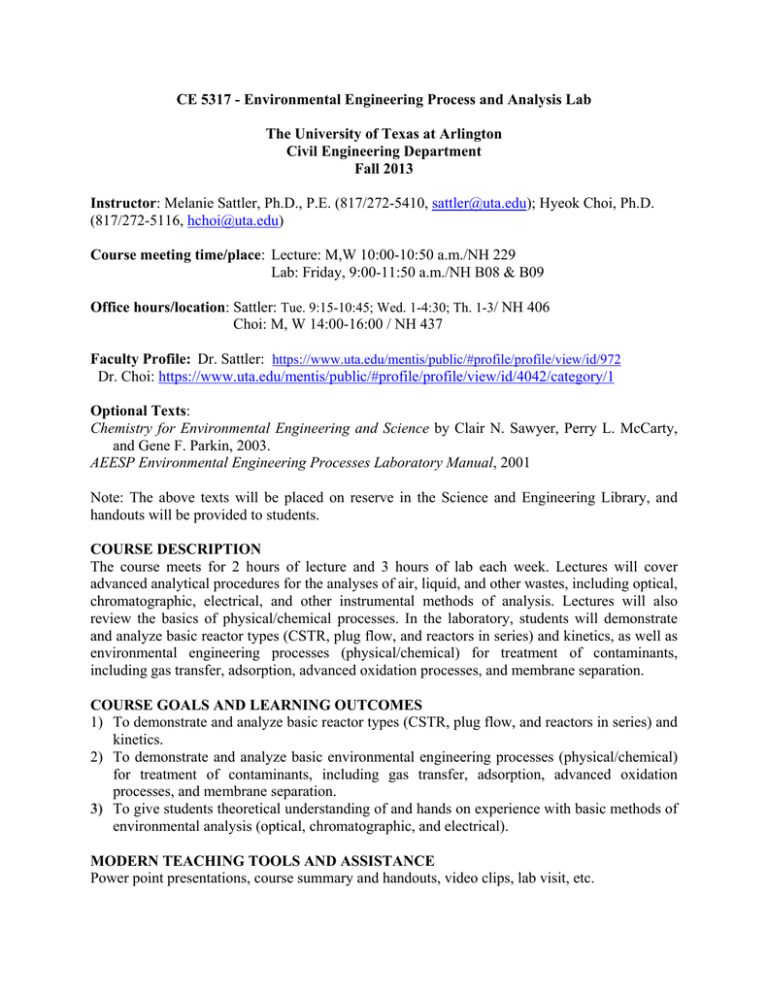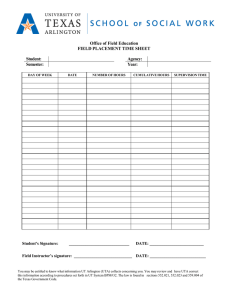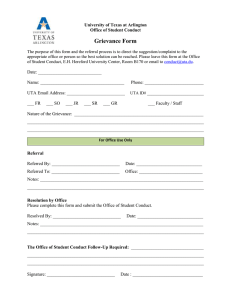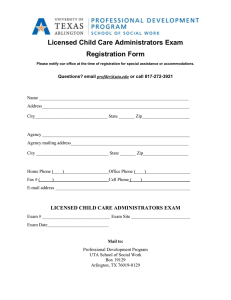CE 5317 - Environmental Engineering Process and Analysis Lab
advertisement

CE 5317 - Environmental Engineering Process and Analysis Lab The University of Texas at Arlington Civil Engineering Department Fall 2013 Instructor: Melanie Sattler, Ph.D., P.E. (817/272-5410, sattler@uta.edu); Hyeok Choi, Ph.D. (817/272-5116, hchoi@uta.edu) Course meeting time/place: Lecture: M,W 10:00-10:50 a.m./NH 229 Lab: Friday, 9:00-11:50 a.m./NH B08 & B09 Office hours/location: Sattler: Tue. 9:15-10:45; Wed. 1-4:30; Th. 1-3/ NH 406 Choi: M, W 14:00-16:00 / NH 437 Faculty Profile: Dr. Sattler: https://www.uta.edu/mentis/public/#profile/profile/view/id/972 Dr. Choi: https://www.uta.edu/mentis/public/#profile/profile/view/id/4042/category/1 Optional Texts: Chemistry for Environmental Engineering and Science by Clair N. Sawyer, Perry L. McCarty, and Gene F. Parkin, 2003. AEESP Environmental Engineering Processes Laboratory Manual, 2001 Note: The above texts will be placed on reserve in the Science and Engineering Library, and handouts will be provided to students. COURSE DESCRIPTION The course meets for 2 hours of lecture and 3 hours of lab each week. Lectures will cover advanced analytical procedures for the analyses of air, liquid, and other wastes, including optical, chromatographic, electrical, and other instrumental methods of analysis. Lectures will also review the basics of physical/chemical processes. In the laboratory, students will demonstrate and analyze basic reactor types (CSTR, plug flow, and reactors in series) and kinetics, as well as environmental engineering processes (physical/chemical) for treatment of contaminants, including gas transfer, adsorption, advanced oxidation processes, and membrane separation. COURSE GOALS AND LEARNING OUTCOMES 1) To demonstrate and analyze basic reactor types (CSTR, plug flow, and reactors in series) and kinetics. 2) To demonstrate and analyze basic environmental engineering processes (physical/chemical) for treatment of contaminants, including gas transfer, adsorption, advanced oxidation processes, and membrane separation. 3) To give students theoretical understanding of and hands on experience with basic methods of environmental analysis (optical, chromatographic, and electrical). MODERN TEACHING TOOLS AND ASSISTANCE Power point presentations, course summary and handouts, video clips, lab visit, etc. FORMAL EVALUATION/MAJOR ASSIGNMENTS & EXAMS Grade Weighting Assignment Weighting, % In-class students (Sec. 001) Lab Reports (6 at 10 pts 60 each) Exam #1 20 Exam #2 20 Grade Basis 90-100% 80-89% 70-79% 60-69% <60 A B C D F Lab reports will be accepted after the class period in which they are due with penalties as follows: 10% penalty if submitted by the next class; 20% if submitted by the second class period following the due date; etc. Expectations for Out-of-Class Study: Beyond the time required to attend each class meeting, students enrolled in this course should expect to spend at least an additional 6-9 hours per week of their own time in course-related activities, including reading required materials, completing assignments, preparing for exams, etc. Lab Safety Training: Students registered for this course must complete all required lab safety training prior to entering the lab and undertaking any activities. Once completed, Lab Safety Training is valid for the remainder of the same academic year (i.e., through the following August) and must be completed anew in subsequent years. There are no exceptions to this University policy. Failure to complete the required training will preclude participation in any lab activities, including those for which a grade is assigned. Drop Policy: Students may drop or swap (adding and dropping a class concurrently) classes through self-service in MyMav from the beginning of the registration period through the late registration period. After the late registration period, students must see their academic advisor to drop a class or withdraw. Undeclared students must see an advisor in the University Advising Center. Drops can continue through a point two-thirds of the way through the term or session. It is the student's responsibility to officially withdraw if they do not plan to attend after registering. Students will not be automatically dropped for non-attendance. Repayment of certain types of financial aid administered through the University may be required as the result of dropping classes or withdrawing. For more information, contact the Office of Financial Aid and Scholarships (http://wweb.uta.edu/ses/fao). Americans With Disabilities Act: The University of Texas at Arlington is on record as being committed to both the spirit and letter of all federal equal opportunity legislation, including the Americans with Disabilities Act (ADA). All instructors at UT Arlington are required by law to provide "reasonable accommodations" to students with disabilities, so as not to discriminate on the basis of that disability. Any student requiring an accommodation for this course must provide the instructor with official documentation in the form of a letter certified by the staff in the Office for Students with Disabilities, University Hall 102. Only those students who have officially documented a need for an accommodation will have their request honored. Information regarding diagnostic criteria and policies for obtaining disability-based academic accommodations can be found at www.uta.edu/disability or by calling the Office for Students with Disabilities at (817) 272-3364. Academic Integrity: All students enrolled in this course are expected to adhere to the UT Arlington Honor Code: I pledge, on my honor, to uphold UT Arlington’s tradition of academic integrity, a tradition that values hard work and honest effort in the pursuit of academic excellence. I promise that I will submit only work that I personally create or contribute to group collaborations, and I will appropriately reference any work from other sources. I will follow the highest standards of integrity and uphold the spirit of the Honor Code. Instructors may employ the Honor Code as they see fit in their courses, including (but not limited to) having students acknowledge the honor code as part of an examination or requiring students to incorporate the honor code into any work submitted. Per UT System Regents’ Rule 50101, §2.2, suspected violations of university’s standards for academic integrity (including the Honor Code) will be referred to the Office of Student Conduct. Violators will be disciplined in accordance with University policy, which may result in the student’s suspension or expulsion from the University. Although asking each other questions about homework assignments is allowed, direct copying is not allowed and will result in a 0 being given for the assignment. Asking each other questions, as well as direct copying, are prohibited on exams and will result in a 0 being given on the exam. Student Support Services: UT Arlington provides a variety of resources and programs designed to help students develop academic skills, deal with personal situations, and better understand concepts and information related to their courses. Resources include tutoring, major-based learning centers, developmental education, advising and mentoring, personal counseling, and federally funded programs. For individualized referrals, students may visit the reception desk at University College (Ransom Hall), call the Maverick Resource Hotline at 817-272-6107, send a message to resources@uta.edu, or view the information at www.uta.edu/resources. Electronic Communication: UT Arlington has adopted MavMail as its official means to communicate with students about important deadlines and events, as well as to transact university-related business regarding financial aid, tuition, grades, graduation, etc. All students are assigned a MavMail account and are responsible for checking the inbox regularly. There is no additional charge to students for using this account, which remains active even after graduation. Information about activating http://www.uta.edu/oit/cs/email/mavmail.php. and using MavMail is available at Student Feedback Survey: At the end of each term, students enrolled in classes categorized as lecture, seminar, or laboratory shall be directed to complete a Student Feedback Survey (SFS). Instructions on how to access the SFS for this course will be sent directly to each student through MavMail approximately 10 days before the end of the term. Each student’s feedback enters the SFS database anonymously and is aggregated with that of other students enrolled in the course. UT Arlington’s effort to solicit, gather, tabulate, and publish student feedback is required by state law; students are strongly urged to participate. For more information, visit http://www.uta.edu/sfs. Final Review Week: A period of five class days prior to the first day of final examinations in the long sessions shall be designated as Final Review Week. The purpose of this week is to allow students sufficient time to prepare for final examinations. During this week, there shall be no scheduled activities such as required field trips or performances; and no instructor shall assign any themes, research problems or exercises of similar scope that have a completion date during or following this week unless specified in the class syllabus. During Final Review Week, an instructor shall not give any examinations constituting 10% or more of the final grade, except makeup tests and laboratory examinations. In addition, no instructor shall give any portion of the final examination during Final Review Week. During this week, classes are held as scheduled. In addition, instructors are not required to limit content to topics that have been previously covered; they may introduce new concepts as appropriate. Librarian to Contact: Sylvia George-Williams, sylvia@uta.edu , Science & Engineering Library, Basement, Nedderman Hall. Emergency Exit Procedures: Should we experience an emergency event that requires us to vacate the building, students should exit the room and move toward the nearest exit, which is located at left of the hallway from B06 and right of the hallway from B09. When exiting the building during an emergency, one should never take an elevator but should use the stairwells. Faculty members and instructional staff will assist students in selecting the safest route for evacuation and will make arrangements to assist handicapped individuals. We will discuss in detail. Other Useful Websites Library Home Page ............................ http://www.uta.edu/library Subject Guides ................................... http://libguides.uta.edu Subject Librarians .............................. http://www.uta.edu/library/help/subject-librarians.php Database List ...................................... http://www.uta.edu/library/databases/index.php Course Reserves ................................. http://pulse.uta.edu/vwebv/enterCourseReserve.do Library Catalog .................................. http://discover.uta.edu/ E-Journals .......................................... http://liblink.uta.edu/UTAlink/az Library Tutorials ............................... http://www.uta.edu/library/help/tutorials.php Connecting from Off- Campus .......... http://libguides.uta.edu/offcampus Ask A Librarian ................................. http://ask.uta.edu The following URL houses a page where we have gathered many commonly used resources needed by students in online courses: http://www.uta.edu/library/services/distance.php Finally, the subject librarian for your area can work with you to build a customized course page to support your class if you wish. For examples, visit http://libguides.uta.edu/os and http://libguides.uta.edu/pols2311fm . If you have any questions, please feel free to contact the Coordinator for Information Services, Suzanne Beckett, at sbeckett@uta.edu or at 817.272.0923. Tentative Schedule: As the instructor for this course, I reserve the right to adjust this schedule in any way that serves the educational needs of the students enrolled in this course. Lecture Week 1 Physical/Chemical/ Biological Process Topic CSTR Reactors Analysis Topic Syllabus, Lab Safety, Statistical Analysis of Analytical Data Lab Text Referencea Ch. 10, AEESP Handout AEESP Lab Manual Sectionb 1-2-1 Title Laboratory Study of Completely Mixed Flow Reactors Using Ion Specific Electrodes N/A Analysis Method Ion Specific Electrodes N/A N/A Laboratory Study of Plug Flow Reactors Ion Specific Electrodes 1-2-2 12.3 Reactors in Series Ion Specific Electrodes 1-2-3 3.10 Kinetics of the Perdisulfate-Iodide System Measurement of Henry’s Law Constants for Volatile Organics Air Stripping N/A 2 N/A Statistical Analysis of Analytical Data Ch. 10, AEESP Handout 12.3 3 Plug Flow Reactors 4 Non-Ideal Reactors 5 Kinetics Electrical Methods of Analysis (Potentiometric analysis: electrodes) Electrical Methods of Analysis (Potentiometric analysis: electrodes) N/A 6 Gas Transfer Chromatographic Methods of Analysis (GC) 12.4 7 Gas Transfer Chromatographic Methods of Analysis (GC) 12.4 8 Review for Mid-Term, Mid-Term a Sawyer, McCarty, and Parkin. b AEESP Environmental Engineering Processes Laboratory Manual N/A handouts Gas chromatography 1-3-4 Gas chromatography 1-4-4 Lecture Week 9 Physical/Chemical/ Biological Process Topic Advanced Oxidation Processes 10 11 13 14 15 Analysis Topic Handoutc Yes High Performance Liquid Chromatography (HPLC) Yes Membrane Separation Technology 12 Lab Yes TOC Analyzer Activated Carbon Adsorption Title Chemical Decomposition of Organic Contaminants (Triclosan) Using Fenton Reaction Analysis Method Handout Yes Chromatographic Analysis of Organic Contaminants (Triclosan) Physical Separation of Biological Suspension Using Membrane Technology Yes Yes Measurement of Total Organic Carbon Yes UV-Vis Spectrophotometer Physical Removal of Organic Dyes (Methylene Blue) Using Activated Carbon Thanks Giving Yes Yes Yes Optical Determination of Organic Dyes (Methylene Blue) d Final c Handouts will be distributed through MavSpace at Ticket Link: https://mavspace.uta.edu/xythoswfs/webui/_xy-4103860_1-t_vLN4Y4Op (Password will be provided soon.) d Yes This lab will be very short. Depending on remaining schedule, this lab can be done on Monday and Wednesday (not Friday). Yes


